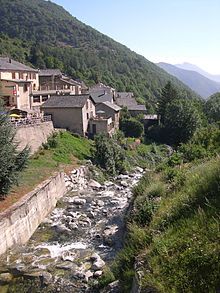User:Wikidwitch/sandbox/camistte
(saving this from the deletionists for future generations)
 USAAF C-47A Skytrains pictured in 1944, similar to the aircraft which crashed on Camisette | |
| Accident | |
|---|---|
| Date | December 5, 1944 |
| Summary | adverse weather/unknown |
| Site | Pic de la Camisette, France 42°40′50″N 2°00′09″E / 42.680613°N 2.002387°E |
| Aircraft type | Dakota M.K.III aircraft (Douglas C-47) |
| Operator | Royal Air Force |
| Flight origin | RAF Northolt, United Kingdom |
| Passengers | 20 |
| Crew | 3 |
| Fatalities | 18 |
| Injuries | 7 |
| Survivors | 6 |
On 5 December 1944 a British Douglas Dakota III aircraft, serial number FL588, of the Royal Air Force crashed on the Pic de la Camisette, a mountain close to the commune of Mijanès, Ariège, in the French Pyrenees. It was on a military transport operation during World War II.
The Dakota was piloted by three RAF pilots. In total twenty-three airmen were on board, including twenty members of the Glider Pilot Regiment. Only six airmen survived the incident; sixteen died in the crash, another died within hours from his injuries. In spite of serious wounds, two of the survivors managed to reach the village of Mijanès to get help for the other survivors.[1][2]
The crash
[edit]FL588 originated from RAF Northolt in West London. Two Dakota planes took off at 09:00 on 5 December on a course for Marseilles to transport 20 glider pilots to France who were trained to pilot Horsa and Hamilcar gliders to carry men and equipment.
Around 15:30 one of the Dakota aircraft crashed on the Pic de la Camisette (alt 2426m ), striking the north face above the Roc de la Musique before coming down facing south-east near a lake. The exact cause of the crash is not known, although it is known that the aircraft came down in a blizzard.
Seven pilots survived the crash initially, with varying degrees of injury but seven died during the night from injuries.[1]
Rescue
[edit]
The following morning, 6 December, the injured Blatch and Baker located Dawkins by following his cries of pain and attempted to bring him to shelter in the plane, but were unable to move him. In spite of having broken both his legs, Dawkins managed to drag himself towards the plane, where the other men gave him shelter in the wrecked fuselage. Blatch and Baker, who were barely able to walk, then went down into the valley to the village of Mijanès and sought help from the local inhabitants. A group of villagers from Mijanes formed a search party and went up to look for survivors, but were thwarted by nightfall and a fierce snowstorm. On 7 December, villagers from neighbouring Artigues retraced the steps of the two airmen and discovered the plane wreck on the Pic de la Camisette. Amid the wreckage they heard cries for help and found the officers Ainsworth, Henwood, Wigmore and Dawkins in the fuselage of the plane, alive but too severely injured to move. With great difficulty, the villagers carried the airmen down from the mountain, following the Barbouillère stream through the snow. The injured men were then taken from Le Pla by ambulance to Carcassonne hospital.[1]
The bodies of eleven men were recovered from the crash site between 10 and 19 December, and buried in Mijanès. The search was suspended due to adverse weather conditions, but in the spring of 1945 a further six bodies were brought down from the crash site after the snow had melted. All of the airmen who died in the crash were later reburied in the Mazargues War Cemetery, Marseilles.[3][4]
Wreckage
[edit]
Remains of Dakota FL 588 have been preserved and today are on display at the Château d'Usson, a ruined medieval Castle noted for its association with the Cathars.[5]
See also
[edit]- Fairy Lochs, a World War II crash site in Scotland
External links
[edit]- L'épave du C47 de la Camisette - photographs of a hiking trip to the Camisette crash site
- Crash du Douglas C-47 - type A-1-DK Skytrain - s/n FL588 (42-92220) NQ-Z - France Crashes 39-45
References
[edit]- ^ a b c "Avion de la Camistte". Mijanes, notre Village (in French). Retrieved 16 September 2011.
- ^ "FLYING DRAMA IN THE PYRENEES – December 5th, 1944". The 24 Sqn RAF Association BLog Book. Retrieved 16 September 2011.
- ^ "Casualty Details: George Horrocks". Commonwealth War Graves Commission. Retrieved 16 September 2011.
- ^ "Sergeant Edward Wakefield". Airborne Assault Paradata. Retrieved 16 September 2011.
- ^ "Photo: Moteur de l'avion anglais tombé au Pic de la Camisette en décembre 1944". Visite de la Maison du Patrimoine du Donezan. Retrieved 16 September 2011.

